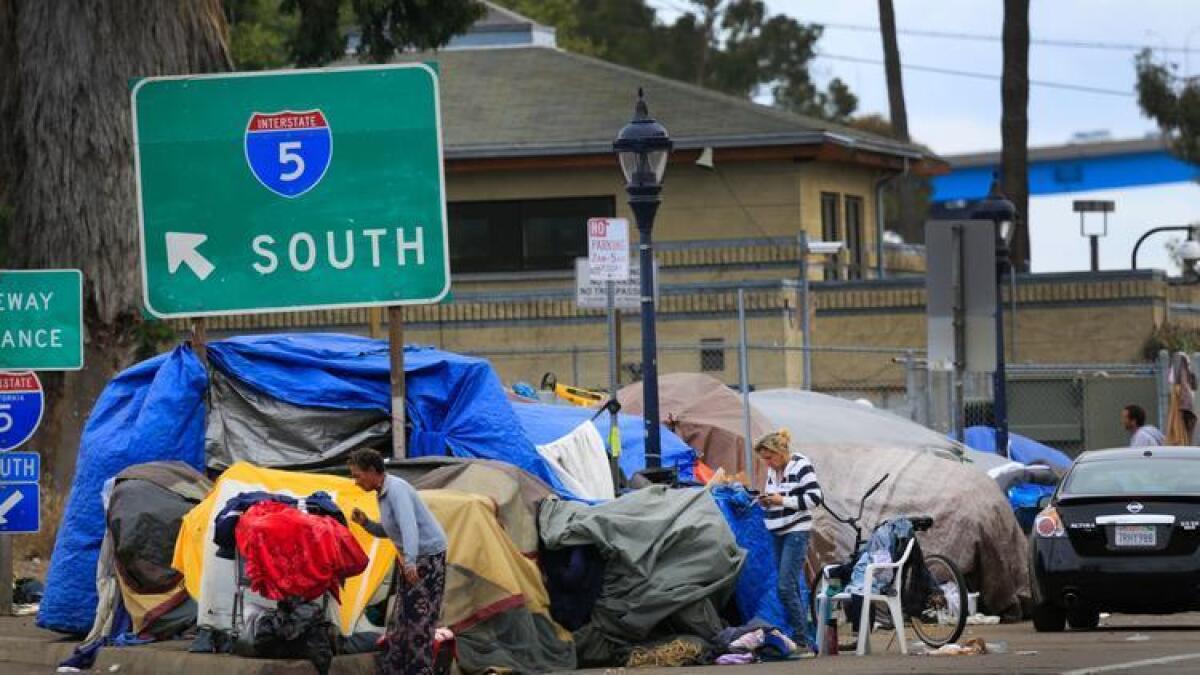Caltrans workers protest having to clean human waste, needles from homeless camps

Arguing that picking up used hypodermic needles and cleaning up human waste is not in their job description, Caltrans workers have filed a grievance with the state over the conditions they face when clearing homeless camps.
“After we met with several groups of them, they said, ‘You know, we didn’t sign up to do this,’” said Steve Crouch, director of public employees for the International Union of Operating Engineers’ bargaining unit that represents California Department of Transportation workers.
Crouch said he has heard similar complaints from Caltrans crews in large cities throughout the state.
Mark Fragoso, the union’s bargaining unit coordinator for Southern California, said the problem has been on the rise for some time. One Caltrans worker in San Diego was pricked with a hypodermic needle on the job and had to undergo several weeks of tests, he said.
“Thank God it came back negative,” he said. “And the scary thing was, he had to go home and tell his family about it. Not knowing was really, really weighing on him.”
The grievance was filed April 23 and asks Caltrans to establish properly outfitted hazmat crews to clear encampments, vaccinations for the workers in the crews and a 10% pay increase for workers assigned to the hazmat crews.
Crouch admitted that when he first heard the complaints, he didn’t grasp the problem because he assumed crews had machinery and personal protective equipment.
They don’t, and that’s one of the things he hopes to change by filing the grievance, he said.
“They have to hand-pick needles and put them in containers, and take buckets of waste and mark it as hazardous material,” he said.
Crouch, who works out of the union’s Sacramento office, said workers raised the issue after seeing a story in the San Diego Union-Tribune about crews spraying chemicals in places where homeless people congregate as part of the city’s efforts to stop a hepatitis A outbreak last year.
Those crews wore hazmat suits and face masks, and Crouch said the Caltrans workers asked why they weren’t given the same equipment.
Besides the danger from hazardous waste at the encampments, Crouch and Fragoso said they also have heard from workers who said they’ve encountered homeless people who throw rocks and sic dogs on them.
Caltrans maintenance workers are paid an average of $46,800 annually, and Crouch said their job description includes clearing brush and other duties normally associated with keeping state property clean. Confrontations with homeless people and exposure to hazardous material are not in their job description, he said, and they should be compensated more for the extra duties and hazards on the job.
“These sites are just littered with tons of trash, human waste, feces, female products,” Fragoso said. “It’s definitely an unsafe situation. We’ve got these guys on the front lines, and they’re good-hearted men and women, and they want to get the job done. We need to ensure they’re getting the job done in a safe manner.”
Crouch said he believes the issue can be resolved quickly, and that he is not asking for a written response to the grievance within 30 days. He is in Florida this week to attend a union conference, but said he hopes to meet with Caltrans officials soon after he returns May 14.
Warth writes for the San Diego Union-Tribune.
More to Read
Start your day right
Sign up for Essential California for news, features and recommendations from the L.A. Times and beyond in your inbox six days a week.
You may occasionally receive promotional content from the Los Angeles Times.






